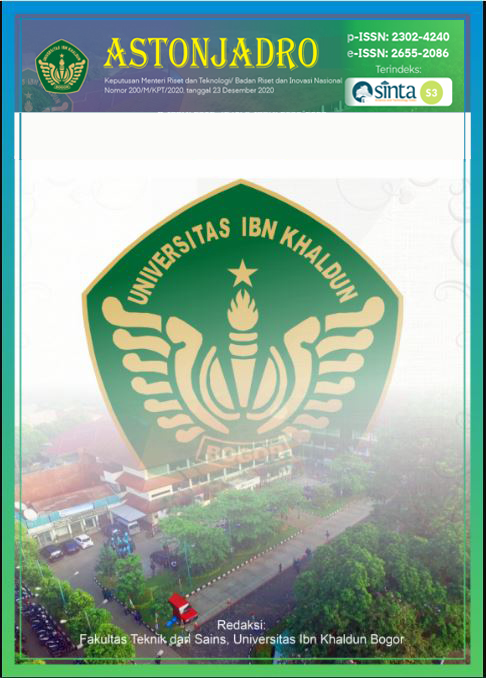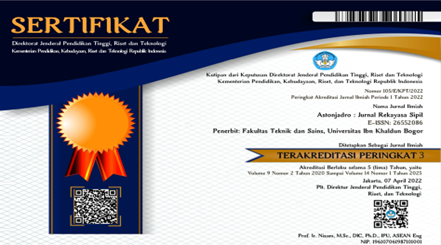The Existence of Badung Market as a Public Space in Community Order in the City of Denpasar
DOI:
https://doi.org/10.32832/astonjadro.v12i1.7839Keywords:
the existence of traditional, modern markets, shoppings, indicator, capital.Abstract
The existence of traditional markets and modern markets, especially in Denpasar City, has become an inseparable part of urban life. Some opinions reveal that with the development of modern markets, traditional markets have become increasingly marginalized. Badung Market is a traditional market located in the center of Denpasar City, Jalan Gajah Mada. The existence of Badung Market as a public space is also known as an icon or identity for the City of Denpasar. Maintaining the social life in Badung Market which is created by the existence of traditions in business life in the Badung Market environment which is the basis for traders to act in selling daily at Badung Market. The purpose of this study is to determine the existence of the Badung Market in Denpasar City. This study uses a mix method that combines quantitative methods with qualitative methods using qualitative methods which are more dominant than quantitative methods. Through qualitative data collection it is processed into quantitative, from quantitative analysis then the findings are explained or interpreted. The research approach used is a case study or case study, this case study approach is used to understand the conditions of the existence of the Badung Market in a social setting in Denpasar City. The efforts of traders to maintain social capital consisting of norms, trust, and bargaining can strengthen loyal networks of market visitors to keep shopping in traditional markets so as to maintain the existence of traders and the existence of traditional markets. From the many determinants of the existence of traditional markets, it can be concluded that the key indicator determining the existence of traditional markets lies in social capital because of its large role.
References
Adriani dan Ali. 2013. Kajian Eksistensi Pasar Tradisional Kota Surakarta. Jurnal Teknik PWK Volume 2 Nomor 2 2013. Undip.
Bambang Djau, ST, 2009. Seminar Nasional Menuju Penataan Ruang Perkotaan Yang Berkelanjutan, Berdayasaing, dan Berotonomi. Seminar Nasional Perencanaan Wilayah dan Kota ITS, ISBN No. 978-979-98808-26.
D Darwin, G Prajati, Y Adicita, IWK Suryawan, A Sarwono. 2021. EVALUATION OF WASTEWATER TREATMENT IN NUSA DUA TOURISM AREA AND THEIR CHALLENGES TO ALGAE BLOOM. ASTONJADRO 10 (2), 346-351.
DR Astoeti, NKA Dwijendra, 2021. GREEN SUPPLY CHAIN PERFORMANCE BASED ON GREEN BUILDING ASSESSMENT (Case Study of Sukawati Art Market Construction Stage, Gianyar Regency). ASTONJADRO 11 (1), 94-107.
D Sinabariba, S Lubis, G Giatwin, 2021. SPORTS ARENA AND ENTERTAINMENT DESIGN. ASTONJADRO 10 (2), 352-372.
Fukuyama, Francis. 1996. Trust: The Sosial Virtues and the Creation of Prosperity. London. Penguin Books.
IGW Kusuma, NKA Dwijendra, NM Yudantini. 2021. DEVELOPMENT STRATEGY PORT OF BIAS MUNJUL IN TOURISM RECOVERY AT THE POST COVID-19. ASTONJADRO 11 (1), 108-117.
IGI Mahendra, IDGAD Putra, 2022. TOURISM-BASED URBAN AGRICULTURAL INTEGRATED FOOD MARKET (CASE STUDY: SINDU MARKET, SANUR, BALI). ASTONJADRO 11 (1), 219-232.
GEK Putra, W Widiastuti, NK Agusintadewi, 2022.Quality of Public Space Safety at Kumbasari Tukad Badung Park, Denpasar. ASTONJADRO 11 (3), 692-697.
Laksono S, 2009. Runtuhnya Modal Sosial, Pasar Tradisional. Penerbit Citra Malang.
Lawang, Robert, 2005. Kapital Sosial dalam Perspektif Sosiologik. FISIP UI Press. Universitas Indonesia.
Mulyandari, Hestin. 2011. Pengantar Arsitektur Kota. Yogyakarta: Andi.
NPYL Vianthi, IDGAD Putra. 2022. EVALUATION OF ARCHITECTURAL COMPONENTS IN BAYUNG GEDE VILLAGE SETTLEMENT, BALI AS A TOURISM OF SPECIAL INTEREST. ASTONJADRO 11 (1), 174-197.
Stephen Carr, et all. 1992. Public Space. Cambridge : Cambridge University Press.
Yuniman dan Wahyudi. 2006. Analisa Perkembangan Pasar Tradisional (Studi Komparatif Terhadap Penggunaan Ruang Komersial di Pasar Atum, Pasar Turi dan Pasar wonokromo). Skripsi Jurusan Manajemen Universitas Kristen Petra Surabaya.
Downloads
Published
How to Cite
Issue
Section
License
Copyright (c) 2022 ASTONJADRO

This work is licensed under a Creative Commons Attribution-ShareAlike 4.0 International License.
Paper submitted to ASTONJADRO is the sole property of the Astonjadro Journal. Unless the author withdraws the paper because he does not want to be published in this journal. The publication rights are in the journal Astonjadro.ASTONJADRO
LICENSE
This work is licensed under a Creative Commons Attribution-ShareAlike 4.0 International License.
Based on a work at http://ejournal.uika-bogor.ac.id/index.php/ASTONJADRO













